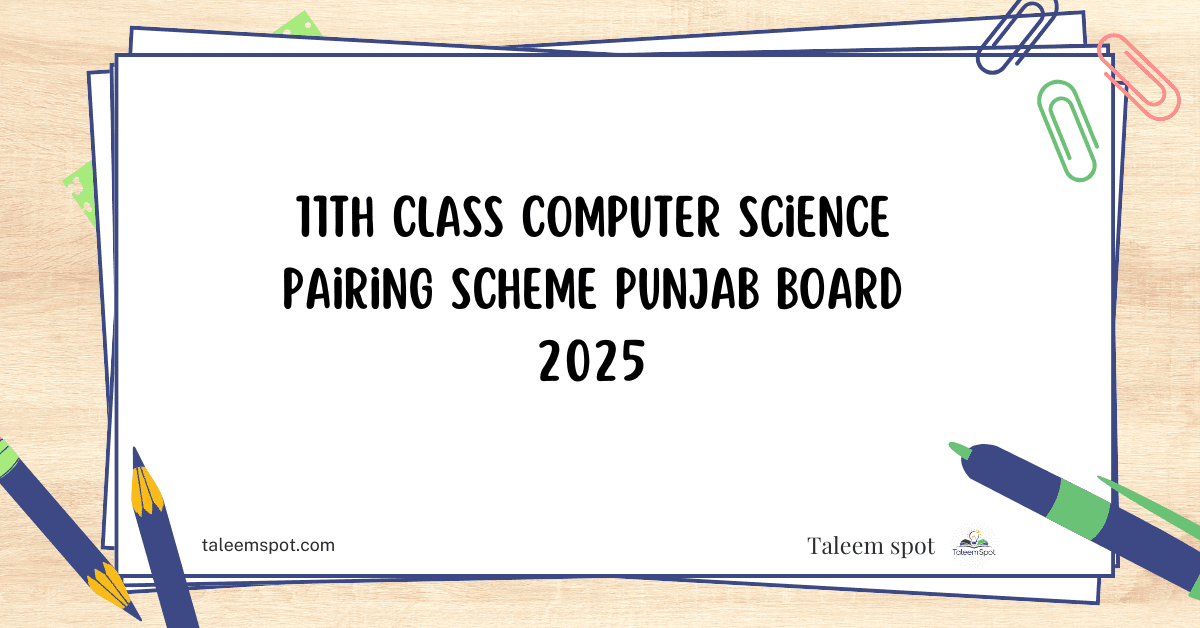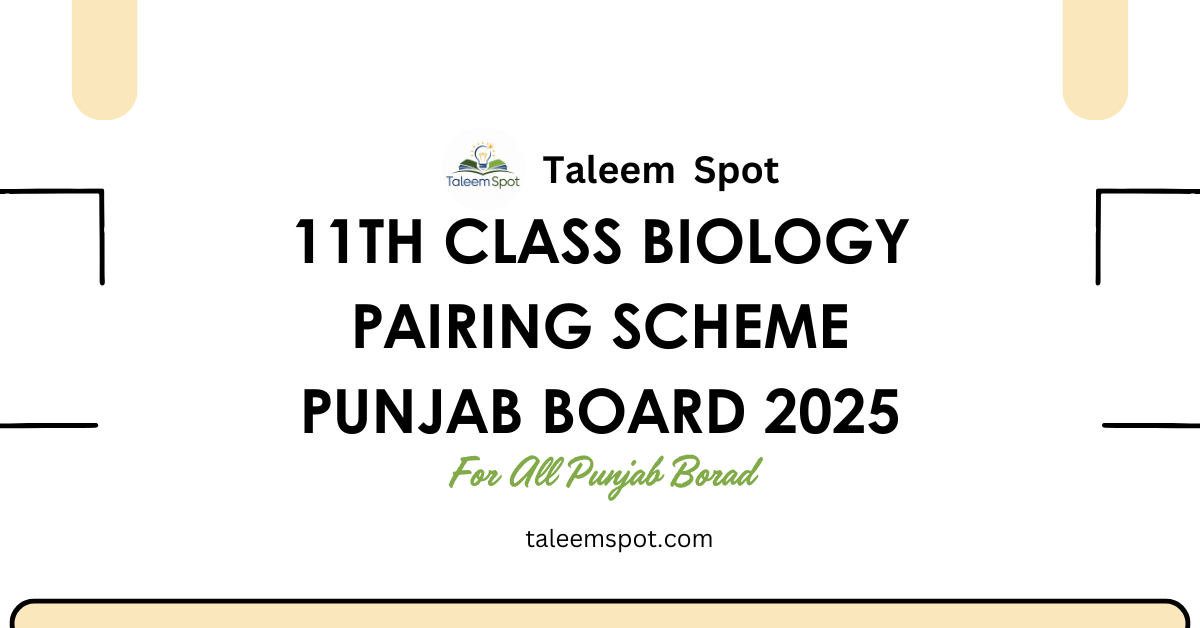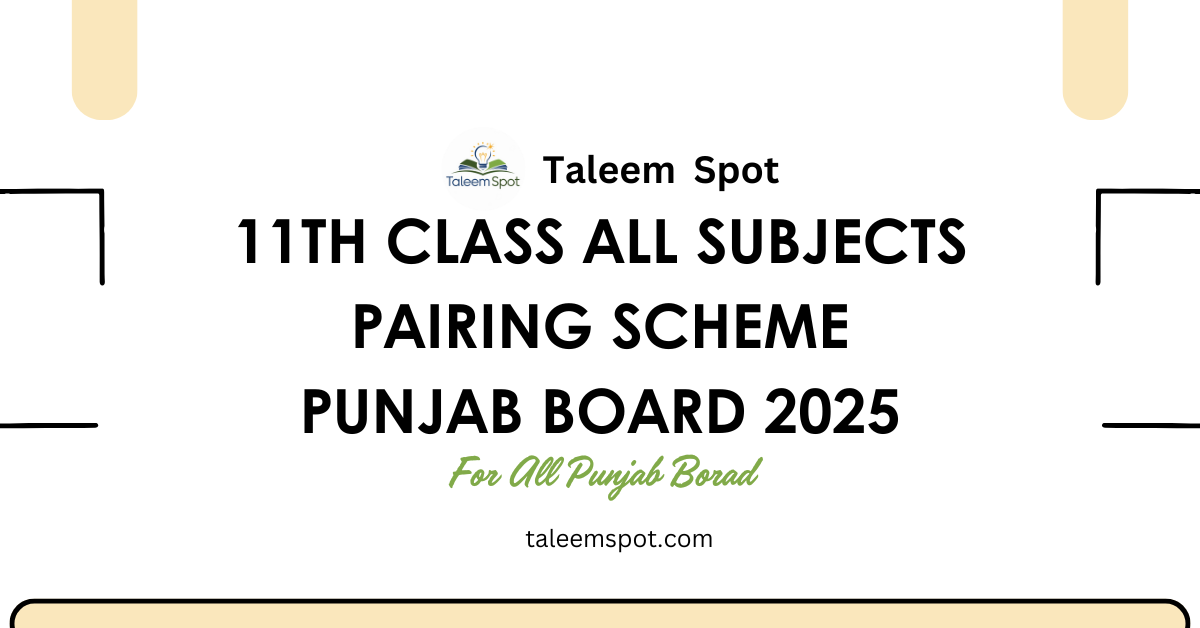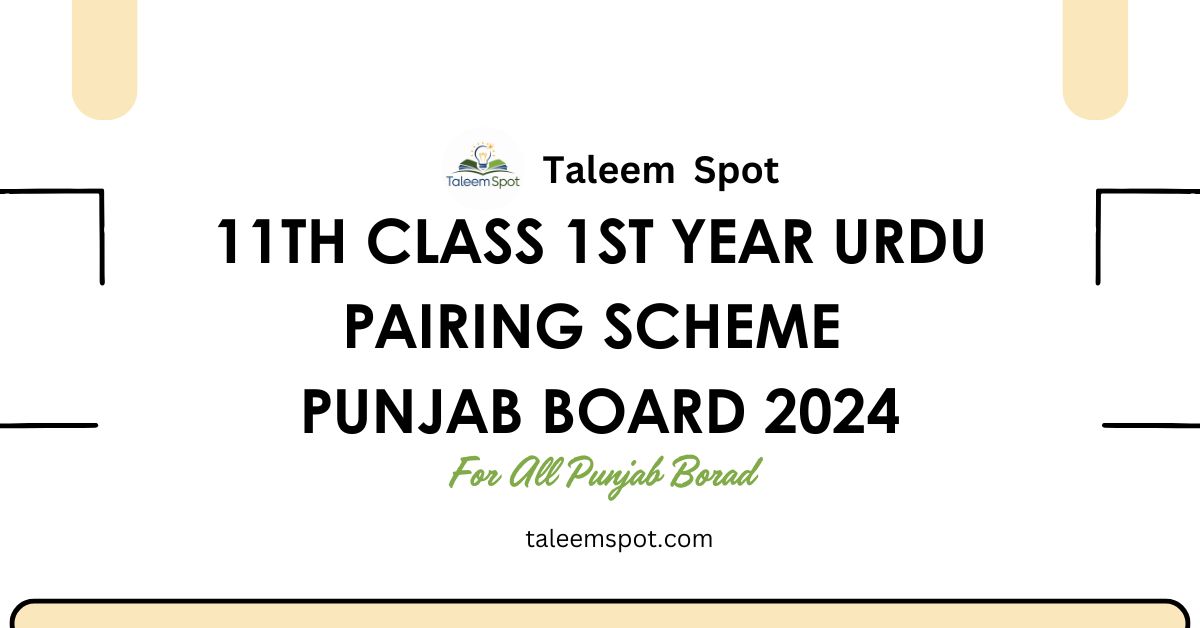11th Class 1st Year Chemistry Pairing Scheme Punjab Board 2025
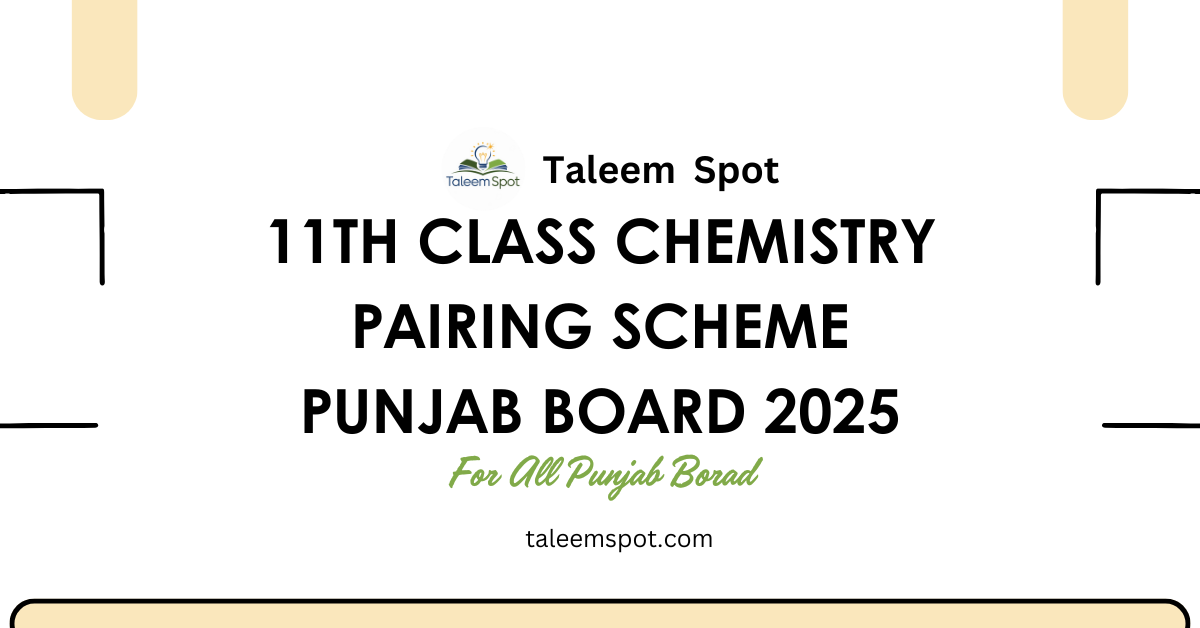
For students gearing up for their 11th class exams, having a clear understanding of the 11th Class 1st Year Chemistry Pairing Scheme Punjab Board 2025 can make all the difference. This pairing scheme serves as a strategic guide, enabling students to focus on the most important topics, sections, and question patterns outlined by the Punjab Board. Whether you’re enrolled in Lahore, Rawalpindi, Multan, Gujranwala, Faisalabad, Bahawalpur, Sahiwal, Sargodha, or Dera Ghazi Khan Board, understanding this scheme is vital for excelling in the chemistry paper.
Chemistry is a subject that combines theoretical concepts with practical application, often making it challenging for students transitioning from 10th to 11th grade. Let’s dive into how the pairing scheme can help streamline your preparation and ensure optimal performance.
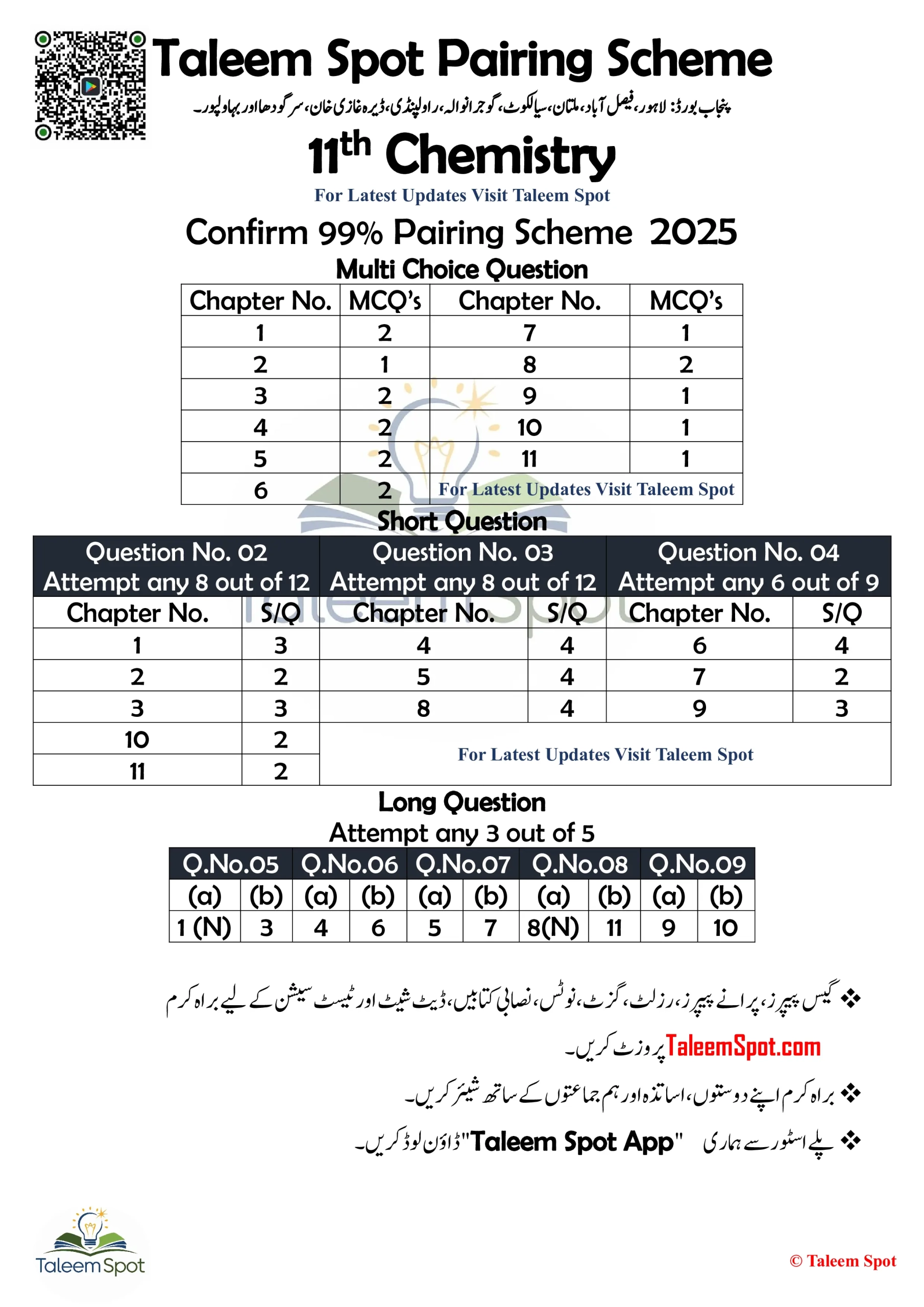
All Subjects Pairing Scheme : Visit Here
Why the 11th Class 1st Year Chemistry Pairing Scheme Punjab Board 2025 Matters
The 11th Class 1st Year Chemistry Pairing Scheme Punjab Board 2025 plays a pivotal role in guiding students to allocate their time and effort effectively. Unlike 9th and 10th grades, the 11th-grade syllabus emphasizes a deeper conceptual understanding of chemistry. The pairing scheme outlines how chapters and topics are linked to various types of questions, including multiple-choice questions (MCQs), short questions, and long questions.
Students often find the long question section particularly daunting. Out of four questions provided in the exam, they must attempt three. The pairing scheme helps identify the chapters that will be combined, ensuring students prepare strategically.
Advantages of Using the Pairing Scheme
Efficient Time Management:
Students can focus on key chapters that are more likely to appear together in the long question section.Better Understanding of Paper Patterns:
Familiarity with the division of questions (MCQs, short, and long) boosts confidence during the exam.Higher Scores with Strategic Preparation:
By concentrating on specific topics, students can achieve better marks with less effort.Consistency Across Boards:
Whether you’re in Lahore, Rawalpindi, or Sahiwal, the chemistry pairing scheme ensures uniformity, making it applicable for all Punjab Boards.
Key Features of the 11th Class 1st Year Chemistry Pairing Scheme Punjab Board 2025
The Punjab Board 11th Class 1st Year Class Chemistry Pairing Scheme 2025 covers various essential components:
1. Multiple-Choice Questions (MCQs)
MCQs often test the fundamental concepts of chemistry. Questions in this section may include basic definitions, chemical formulas, periodic table trends, and numerical values like atomic mass. The pairing scheme ensures all chapters contribute to this section, balancing the difficulty level.
2. Short Questions
The short question section requires concise answers to conceptual queries. Topics such as:
- Atomic Structure
- Chemical Bonding
- States of Matter
are frequently highlighted. The pairing scheme helps identify which chapters are grouped for short questions, ensuring students can prepare accordingly.
3. Long Questions
Long questions are the most significant part of the chemistry paper, requiring detailed answers. These questions usually combine theoretical concepts with mathematical problem-solving. For instance:
- One long question may involve the derivation of gas laws.
- Another might focus on the application of thermodynamics in chemical reactions.
The pairing scheme indicates which chapters are paired, making it easier for students to practice comprehensively.
Board-Specific Insights into the Pairing Scheme
Lahore Board
The 11th Class 1st Year Chemistry Pairing Scheme Lahore Board 2025 emphasizes numerical problem-solving and real-world applications of chemistry. Students should focus on chapters like “Chemical Equilibrium” and “Thermodynamics.”
Rawalpindi Board
For the 11th Class 1st Year Chemistry Pairing Scheme Rawalpindi Board 2025, expect a mix of conceptual and practical questions. “States of Matter” and “Atomic Structure” often dominate the paper pattern.
Multan Board
The Multan Board 11th Class 1st Year Chemistry Pairing Scheme 2025 places additional weight on topics like “Periodic Table and Periodicity” and “Molecular Orbital Theory.” Numerical problems from these chapters are common.
Gujranwala Board
Students preparing for the Gujranwala Board 11th Class 1st Year Chemistry Pairing Scheme 2025 should pay special attention to chemical bonding theories and stoichiometry.
Faisalabad Board
The Faisalabad Board 11th Class 1st Year Chemistry Pairing Scheme 2025 often includes direct questions from the “Thermodynamics” and “Chemical Kinetics” chapters. Focused preparation can significantly boost scores.
Bahawalpur Board
For the Bahawalpur Board 11th Class 1st Year Chemistry Pairing Scheme 2025, prioritize numerical questions and practical aspects from chapters like “Solutions and Colloids.”
Sahiwal Board
The 11th Class Chemistry Pairing Scheme Sahiwal Board 2025 highlights fundamental chemistry principles, with balanced coverage of theoretical and numerical problems.
Sargodha Board
The Sargodha Board 11th Class Chemistry Pairing Scheme 2025 focuses on chapters with experimental applications, such as “Chemical Bonding” and “Thermochemistry.”
Dera Ghazi Khan Board
The Dera Ghazi Khan Board 11th Class Chemistry Pairing Scheme 2025 emphasizes MCQs and long questions derived from “Equilibrium” and “Gases.”
Preparation Tips for 11th Class Chemistry Using the Pairing Scheme
Study Chapter Combinations:
Use the pairing scheme to identify chapter pairings for long questions. This ensures you cover topics that are more likely to appear together.Focus on Weak Areas:
Pinpoint your weak areas and prioritize chapters that carry significant weight in the pairing scheme.Practice Numericals:
Many boards focus on numerical problems in the long question section. Ensure you practice problems from all relevant chapters.Review Past Papers:
Combine the pairing scheme with past papers to familiarize yourself with recurring patterns.Time Your Practice:
Allocate time based on the pairing scheme, ensuring you cover high-priority chapters thoroughly.
Findings
The 11th Class 1st Year Chemistry Pairing Scheme Punjab Board 2025 is a powerful tool that empowers students to prepare strategically for their exams. By focusing on the key chapters outlined in the scheme, students can allocate their study time effectively, mastering both theoretical concepts and numerical applications. Whether you’re a student of Lahore, Rawalpindi, or any other Punjab Board, this scheme ensures consistent preparation standards.
Using the pairing scheme alongside disciplined study habits can help students achieve exceptional results in their 11th-grade chemistry exams.
FAQs
1. What is the 11th Class Chemistry Pairing Scheme Punjab Board 2025?
The pairing scheme is a guide provided by the Punjab Board that outlines the question patterns and chapter pairings for chemistry exams.
2. How does the pairing scheme help students?
It helps students focus on key topics, manage their time, and prepare strategically for MCQs, short questions, and long questions.
3. Is the pairing scheme the same for all Punjab Boards?
Yes, the chemistry pairing scheme is uniform across all Punjab Boards, including Lahore, Rawalpindi, and Multan.
4. What chapters are important for long questions?
Chapters like “Chemical Equilibrium,” “Thermodynamics,” and “States of Matter” are often highlighted for long questions.
5. How should I use the pairing scheme for preparation?
Identify chapter pairings, prioritize high-weightage topics, and practice past papers based on the scheme.
6. Are numericals important in the chemistry paper?
Yes, numerical questions are crucial, especially in topics like “Thermodynamics” and “Chemical Equilibrium.”
7. Is the pairing scheme reliable?
Yes, it is prepared by experienced teachers who are familiar with board exam patterns.
8. Can I rely solely on the pairing scheme?
While the pairing scheme is helpful, combine it with comprehensive study to ensure success.
9. Is the pairing scheme free?
Yes, platforms like Taleem Spot provide it free of cost.
10. Where can I find past papers aligned with the pairing scheme?
Past papers are available on educational websites, helping you align your preparation with the pairing scheme.

